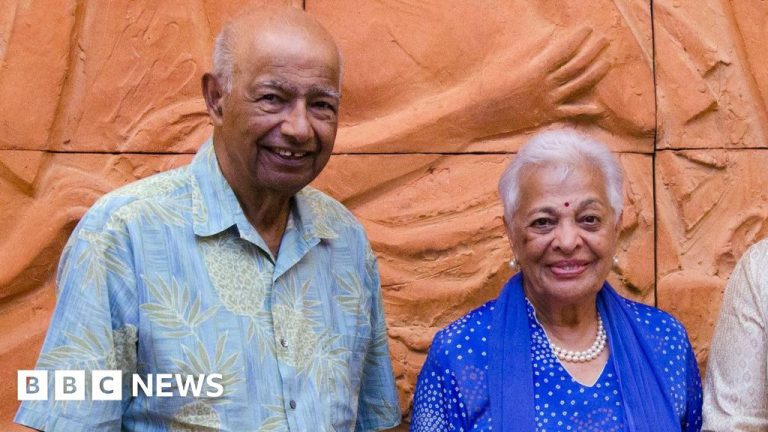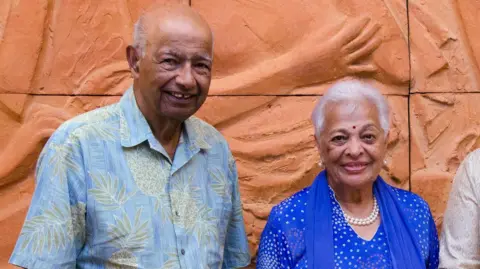

In 1915, 29-year-old Indian entrepreneur Jhamandas Watumull arrived on the island of Honolulu in Hawaii to open a retail store of his importing business with his partner Dharamdas.
The two men registered Watumull & Dharamdas as a business on Honolulu’s Hotel Street, selling exotic goods like silk, ivory crafts, brassware and other Eastern trinkets .
Dharamdas died of cholera in 1916, prompting Jhamandas Watumull to bring in his brother Gobindram to manage their store in Honolulu while he handled their business in Manila. Over the next few years, the brothers would travel between India and Hawaii to consolidate their business.
Today, the Watumull name is ubiquitous across the islands: from clothing manufacturing to real estate to education to artistic philanthropy, the family is inextricably linked to Hawaii’s rich history.
The first South Asians to settle on the island from India, they are now one of the richest families on the island.
“Slowly, slowly, that’s how we did it,” Jhamandas said a local Hawaiian publication in 1973.
Born in pre-independent India, Jhamandas was the son of a brick contractor in Hyderabad, Sindh province (now in Pakistan). The family was educated but not wealthy. After an accident paralyzed his father, Jhamandas’ mother bought his passage to the Philippines where he began working in textile factories. In 1909 he began his own business venture in Manila with his partner Dharamdas.
His grandson JD Watumull says Jhamandas and Dharamdas moved to Hawaii following a decline in their business in Manila after the United States, which occupied the Philippines at the time, reduced ties with foreign businesses.
Their business in Hawaii was renamed East India Store shortly after Jhamandas’ brother Gobindram began managing it. Over the next few years, the company grew into a department store with branches in several parts of Asia as well as Hawaii, says SAADA, a digital archive of South Asian American history.
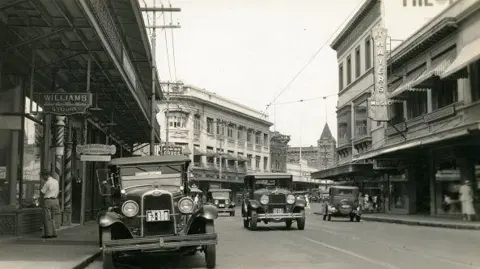

In 1937, Gobindram constructed the Watumull Building in the Waikiki neighborhood of Honolulu to house the company’s headquarters. According to SAADA, the multi-million dollar business had expanded to 10 stores, a building and various commercial developments by 1957.
The Star-Bulletin newspaper described the store’s products—linens, lingerie, brass and teakwood trinkets—as woven with “romanticism and mystery” that transported “to distant lands and fascinating scenes.”
Aloha shirts
As Hawaii became a popular destination for wealthy tourists in the 1930s, brightly colored shirts with island designs called an “Aloha shirt” became a sought-after souvenir.
According to Dale Hope, an expert on Hawaiian textiles and patterns, Watumull’s East Indian store was one of the first on the island to carry designs with Hawaiian patterns.
The designs were first commissioned in 1936 by Gobindram from his artist sister-in-law Elsie Jensen.
“Instead of Mount Fuji she would have Diamond Head, instead of koi (she would have) tropical fish, instead of cherry blossoms (she would have) gardenias and hibiscus and everything we know here,” Hope said.
The designs were sent to Japan where they were hand-blocked onto raw silk, writes Nancy Schiffer in the book Hawaiian Shirt Designs.
“These subtle floral designs, modern and dynamic in concept, were the first Hawaiian designs to be produced commercially,” notes Schiffer.
“They were sold by ship and exhibited as far away as London,” explains William Devenport in the book Paradise of the Pacific.
Gobindram’s daughter, Lila, told Hope that Watumull’s Waikiki store had American movie stars Loretta Young, Jack Benny, Lana Turner and Eddie “Rochester” Anderson come in to buy the shirts.
“We are increasingly seeing that Watumull has become synonymous with Hawaiian fashion,” Gulab Watumull said in a 1966 interview in the Honolulu Star-Bulletin.
The Watumulls soon purchased the Royal Hawaiian Manufacturing Company, where the first matching aloha family clothing was made. created.
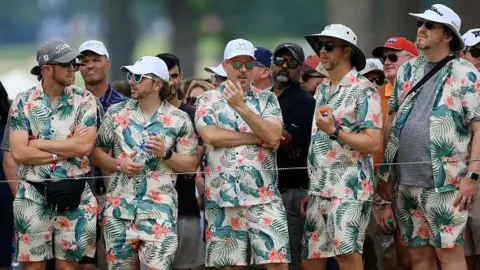

A long road to citizenship
Despite their success, it would be decades before the Watumull brothers – Jhamandas and Gobindram – obtained American citizenship. Their early years in the country were marked by discrimination and harsh immigration laws, according to Hawaii Business Magazine. wrote.
In 1922, Gobindram married Ellen Jensen, an American whose citizenship was revoked under the Cable Act for marrying an immigrant who was not eligible for American citizenship. Jensen would continue to work with the League of Women Voters to reform the law and regain citizenship in 1931.
Gobindram became a citizen in 1946 when a law allowing Indians to obtain citizenship by naturalization was enacted.
His brother Jhamandas, meanwhile, continued to divide much of his time between India and Hawaii.
When India was partitioned in 1947, the Watumull family left Sindh to settle in Bombay (now Mumbai), leaving behind much of their property, SAADA explains.
Jhamandas’ son, Gulab, eventually arrived in Hawaii to work in the family business and become its leader.
In 1955, the brothers parted ways with the business, with Jhamandas and Gulab retaining the retail portion while the Gobindram family took over the real estate portion.
Jhamandas moved to Hawaii permanently in 1956, a few years after the deaths of his wife and one of their sons, and in 1961 he became a United States citizen.
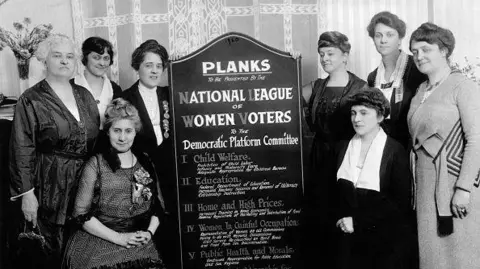

India goes online
Over the years, the family has remained invested in the well-being of India and its people. Gobindram was an active member of the Indian Freedom Committee and often visited Washington to support the country’s cause of independence, writes Elliot Robert Barkan in Making it in America.
Gobindram’s house in Los Angeles was “a mecca for people concerned about Indian independence”, notes Sachindra Nath Pradhan in the book India in the United States.
In 1946, the Watumull Foundation sponsored a series of lectures by Dr S Radhakrishnan – who was later President of India – at American universities.
Gobindram’s wife, Ellen, was instrumental by organizing an international parenting conference in Delhi in 1959, leading to the establishment of the country’s first birth control clinics.
The family’s philanthropy has included and continues to include funding for educational institutions in Hawaii and India, endowments for Honolulu-based arts programs, and promotion of Indo-Hawaiian exchange.
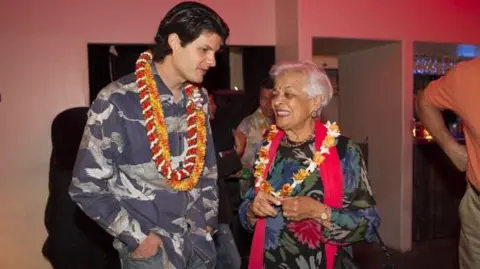

Many of the Watumull brothers’ grandchildren now work in and around Hawaii.
In recent years, as the family business has moved into real estate, the last Watumull store closed in 2020. The company thanked its customers “for years of good business and good memories”.
Watumull Properties purchased a 205,000 square foot (19,045 m²) market in Hawaii last year. JD Watumull, the company’s president, said“The Hawaiian Islands continue to be our family’s focus today and into the future.”
Follow BBC News India on Instagram, YouTube, Twitter And Facebook.


